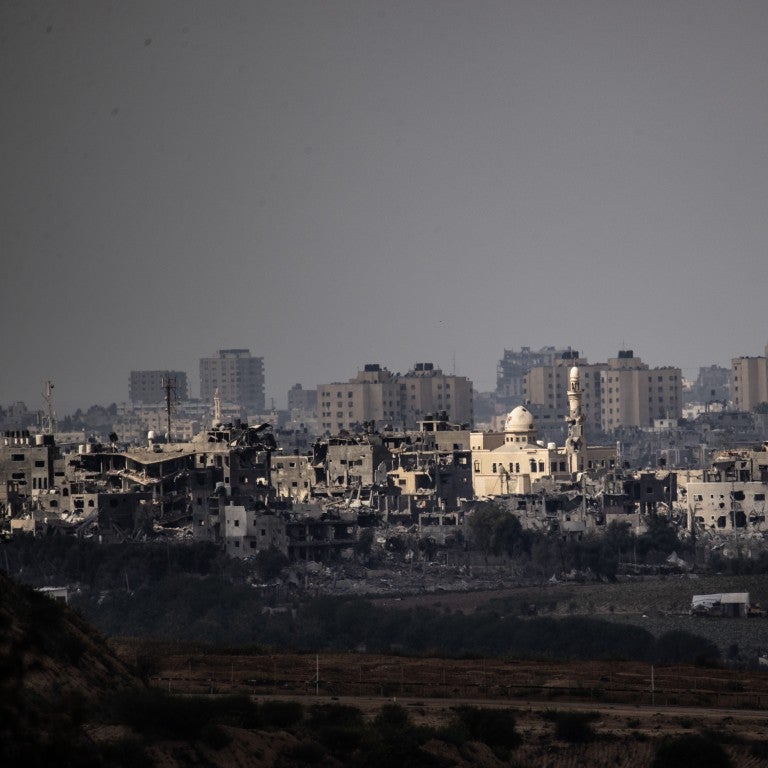January 19, 2023
Despite its dynamic democracy and thriving economy, Israel is perhaps the most misunderstood and mischaracterized country. As the world’s only Jewish state, it is unfairly singled out in global forums for condemnation over its policies and even mere existence. It is also the target of antisemitic falsehoods and conspiracy theories.
Here are four common tough questions on Israel that address some of the issues surrounding the Jewish state.
American Jewish Committee (AJC) is tackling several tough questions and topics in 2023. What should we answer next? Email us at toughquestions@ajc.org to let us know.
- Can one simultaneously be pro-Israel and pro-Palestinian?
Yes, support for Israel does not preclude support for the national aspirations of the Palestinian people or any other nation for that matter. Over the last 25 years, much of the discussion surrounding the Israeli-Palestinian conflict has been focused on the creation of a two-state solution, which calls for Israeli and Palestinian states living side by side in peace with mutually agreed-upon borders. Most governments and world bodies have declared a two-state solution as official policy, including the United States, United Nations, and European Union.
The Oslo Accords, a pair of agreements between Israel and the Palestine Liberation Organization (PLO) during the 1990s, set in motion a roadmap for negotiations leading to a two-state solution. However, the rejection of various peace proposals by the Palestinians, including the 2000 Camp David Summit, as well as an increase in Palestinian terrorism, especially during the Second Intifada, eroded support for peace negotiations. Polling in recent years has also highlighted declining support for a two-state solution, with Israelis expressing mixed opinions, while most Palestinians are largely against the solution. In particular, Israeli leaders have accused the Palestinian Authority leadership of never truly supporting a sustainable two-state solution, instead treating it as a pretense for an eventual binational state with a Palestinian majority. Meanwhile, Palestinian terror groups such as Hamas and Islamic Jihad reject a two-state solution and call for Israel to be replaced by an Islamic Palestinian state. Nevertheless, efforts by the international community, most recently the Trump administration’s “Peace to Prosperity” plan, have attempted to revive a two-state solution. The Biden administration has also endorsed the policy, but has signaled the time is not right to restart Israeli-Palestinian talks. In 2022, Israel’s Prime Minister Yair Lapid endorsed the two-state solution during a speech at the opening of the UN General Assembly.
Despite the halted status of the peace process, one can still support the national aspirations of the Palestinian people and a fair solution to the Israeli-Palestinian conflict.
- How can visiting Israel and experiencing life there inform one’s views of the realities on the ground?
When it comes to Israel, there’s no substitute for first-hand experience.
For a small nation, Israel receives a disproportionate amount of attention, which can lead to widespread biases and ignorance about the world’s only Jewish state.
However, Israel is so much more than how it is normally perceived in the news media. It is a modern and vibrant country, with a diverse array of people from nearly all walks of life. According to Israel’s Central Bureau of Statistics, it is home to over 9.5 million people, with 74% Jewish, 21% Arab, and 5% from other groups.
Israel’s diversity doesn’t end there. Israel is an immigrant-absorbing country. One out of every four Israelis is foreign-born. The country is home to all streams of Judaism, from the secular to the ultra-Orthodox. Its Arab population is also comprised of a flourishing Christian community, one of the few in the Middle East that is growing, Muslims, and lesser-known minority groups such as Circassians, Druze, and Maronites.
Traveling to Israel also helps you understand the many threats its people face. At its narrowest, it is just nine miles from Israel’s Mediterranean coast to the West Bank. Traveling to the north, you can peer into Lebanon and Syria, where the Iranian-backed Hezbollah terror group or the Islamic State operates. In the south, you can visit Sderot and see its proximity to the Gaza Strip, controlled by the Palestinian terror group Hamas, and witness the bomb shelters and rocket damage in the city.
Understanding the irreplaceable value of first-hand experience, AJC’s Project Interchange program brings global decision-makers, including government officials, university leaders, civic and religious leaders, and media professionals to Israel to see and experience the real Israel – up close, unfiltered, and in person.
- Is Israel only for Jewish people?
It is no secret that modern Israel was established as the homeland of the Jewish people. Stateless for millennia, the creation of Israel in 1948 was a watershed moment and provided a haven for millions of Jews, who, in the wake of the Holocaust, could now control their fate.
In 1950, Israel’s Knesset passed the Law of Return, which guarantees that every Jew has the right to immigrate to the country (make Aliyah) and gain automatic citizenship.
The idea of modern Israel itself is rooted in Zionism, Israel’s national ideology that Jews have a right to self-determination in their ancestral homeland, Israel.
While the Jewish people trace their nationhood back to the biblical kingdoms of David and Solomon, modern Zionism stems from the 19th century, coinciding with rising nationalism and antisemitism in Europe.
There are often two different streams of nationalism – ethnic and civic nationalism. Zionism is squarely an ethnic nationalism, which calls for the Jewish nation to form a home in the ancestral land of Israel. Many other countries also are formed around ethnic nationalism defined by a shared language, culture, or religion. For example, Ireland is the home of the Irish people and has a form of repatriation law similar to Israel that provides rapid citizenship to members of its diaspora.
However, other countries such as the United States and Canada, are not defined by a language or culture, but instead by civic institutions and liberal principles such as the U.S. Constitution that serve as a central unifying theme.
Despite Israel being firmly rooted in Zionism, this does not exclude others from being citizens of the state. According to Israel’s Central Bureau of Statistics, it is home to over 9.5 million people, with 74% Jewish, 21% Arab, and 5% from other groups.
Indeed, Arabs in Israel, like Jews, have full citizenship and enjoy all the same rights and privileges that it entitles. Within Israel are a diverse array of other non-Jews, including lesser-known minority groups such as Circassians, Druze, and Maronites. Those who are not Jewish can also gain citizenship after living in the country for a certain period after gaining permanent residency and fulfilling other requirements such as Hebrew language proficiency.
- Are Israelis mostly of European descent?
The short answer is no. With the emergence of identity politics in recent years, there has been a focus on viewing the Israeli-Palestinian conflict through the lens of race. Critics of Israel contend that the Jewish state is a “settler-colonialist” entity that was established as a refuge for white European Jews, or Ashkenazi Jews, at the expense of people of color – the Palestinians.
Israel was established as the world’s only Jewish state, and this includes not only Jews from Europe but Jews from all over the world.
Despite many early immigrants to pre-state Israel hailing from Europe, today Israel includes a significant portion of Jews hailing from the Middle East and North Africa, known as Mizrahi/Sephardic Jews. These Jews emigrated, fled, or were expelled from countries in this region during the years after the establishment of Israel, in many cases due to state-sanctioned antisemitism and attacks. Further waves of Jewish immigration ensued in the following decades from the former Soviet Union, Ethiopia, and elsewhere. Recently, Israel welcomed more than 31,000 immigrants from Ukraine and Russia due to Russia’s war on Ukraine. Visiting Israel today, you will find Jews who came from not only Poland, Argentina, or Germany but also Jews from lesser-known communities such as Bukharan Jews from Central Asia or the Bnei Menashe tribe of Jews from eastern India.
But even among Ashkenazi Jews, there is considerable genealogical, cultural, and religious evidence of their unbroken connection to the land of Israel, despite centuries in exile. This can be seen in the customs and religious traditions of Ashkenazi Jews that always placed a return to Israel at the centerpiece of their faith, or genetic studies on Ashkenazi Jews that indicate Middle Eastern origins.
The bottom line is Jews have continuously lived in the land of Israel since the time of the Bible, and modern Israel now provides a home or refuge for Jews from all corners of the world.
- Is Israel an Apartheid state?
The truth is that this is one of the most commonly employed malicious lies against Israel, which seeks to cast it as uniquely evil and worthy of being dismantled.
According to the Cornell Legal Information Institute, “apartheid refers to the implementation and maintenance of a system of legalized racial segregation in which one racial group is deprived of political and civil rights.”
All citizens of Israel enjoy full civil rights, and the Israeli Knesset (parliament) has included significant representation of elected Arab members. The Arabic language has a special status in Israel and Arab Israelis participate in civic life at all levels, including serving in senior posts in education, healthcare, and law.
According to agreements signed between the Israeli government and the Palestinian Authority (PA) in the mid-1990s, known as the Oslo Accords, Israel maintains overall security control of the West Bank, while administrative control was divided between Israel and the PA. Under the agreements, Palestinian residents of the West Bank and Gaza Strip overseen by the PA are supposed to exercise their democratic rights in Palestinian elections. Regrettably, PA President Mahmoud Abbas has not permitted elections since 2006. (Hamas now controls the Gaza Strip, having ousted the PA in a violent coup in 2007.)
Some point to separate roads and checkpoints in the West Bank as examples of “apartheid,” but these are security measures that are instituted or removed according to the security situation on the ground and have saved countless Israeli and Palestinian lives. A separation barrier—another frequent target of those claiming “apartheid”—was only erected between Israel and parts of the West Bank in the early 2000s, following Palestinian terrorist attacks during the Second Intifada that killed hundreds of Israelis. The barrier has been essential to curbing these attacks, which plummeted after its construction.
While criticizing these security measures is fair game, the employment of the term “apartheid” is meant to demonize Israel, avoid a meaningful debate, and cast those who defend Israel as uniquely evil.





